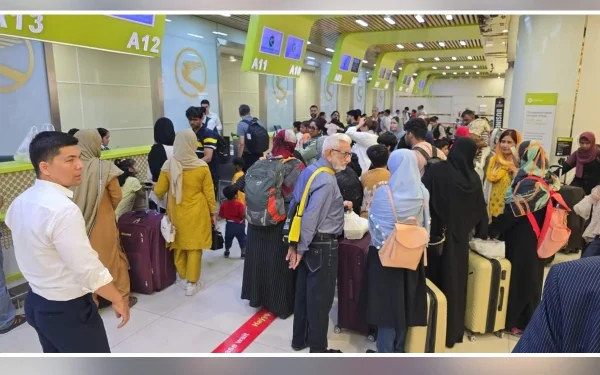In a significant humanitarian and diplomatic effort, Pakistan International Airlines (PIA) successfully brought home 107 Pakistani nationals stranded in Iran, following the sudden closure of Iranian airspace. The special repatriation flight, PK 9552, landed safely at Islamabad International Airport at 3:00 am, marking the culmination of a carefully coordinated rescue operation involving multiple government agencies and diplomatic missions.
Background: Why Pakistanis Were Stranded in Iran
The Pakistani citizens had been stranded in various parts of Iran due to an unexpected closure of Iranian airspace, which came amidst growing regional tensions and security concerns. With flight operations suspended, these citizens were left with no immediate means of returning home. Many of them were students, business professionals, pilgrims, and travelers who had crossed into Iran for legitimate reasons but became stuck when air connectivity was disrupted.
Recognizing the urgency of the matter, the Government of Pakistan took immediate action to facilitate their safe return. The stranded individuals were transported by land route from Iran to Ashgabat, the capital of Turkmenistan, from where their airlift to Islamabad was arranged via a special PIA flight.
Logistical Coordination Between Embassies
This successful repatriation was made possible due to the strong diplomatic coordination between the Pakistani embassies in Tehran and Ashgabat. Both diplomatic missions worked tirelessly to ensure safe passage, timely documentation, and travel clearances for all 107 passengers. In a statement, government officials acknowledged that without the active involvement of the embassies, executing such a large-scale repatriation operation would have been a significant challenge.
The operation demonstrated not only effective inter-agency collaboration but also Pakistan’s commitment to the safety and well-being of its citizens abroad, particularly in times of international emergencies or conflict-related travel disruptions.
Special Flight PK 9552: A Humanitarian Effort
The flight PK 9552, which eventually brought the stranded Pakistanis back home, was dispatched by PIA on direct instructions from the Government of Pakistan. The national airline rapidly mobilized resources, coordinated with authorities in Turkmenistan, and ensured that the aircraft could safely depart from Ashgabat and land in Islamabad.
According to a PIA spokesperson, the special flight was part of the airline’s decades-long tradition of serving the nation during times of crisis. The spokesperson added that PIA remains committed to executing its national duty, even under complex logistical and diplomatic conditions.
“This mission is yet another example of PIA’s determination to serve the people of Pakistan in the most challenging circumstances,” the spokesperson stated.
Passengers Express Gratitude to Pakistan Government and PIA
Upon landing in Islamabad, several passengers expressed deep appreciation to both the Government of Pakistan and PIA for making their safe return possible. The passengers, some of whom had been stranded for several days, described the situation as stressful and uncertain, and commended the authorities for taking swift and efficient action.
One returning passenger, a student from Karachi, stated:
“We had no idea when we’d get back. The arrangements made by the embassy and the government were incredibly reassuring. We are thankful to be home.”
Another passenger, a businessman from Lahore, added:
“It was a challenging few days. But the moment we saw the Pakistani flag on the plane in Ashgabat, we felt relief. It was a proud moment.”
Iran’s Airspace Closure: Context and Implications
The closure of Iranian airspace, which triggered this crisis, has affected not only Pakistani travelers but also global flight operations. Several international airlines have had to reroute flights or cancel operations altogether due to regional instability, particularly in the wake of rising tensions involving Iran and neighboring countries.
For Pakistan, whose proximity to Iran and deep bilateral ties lead to regular movement of people across borders, such disruptions have direct consequences. Thousands of Pakistani pilgrims, especially those traveling to religious sites in Mashhad and Qom, and trade delegates often use Iran’s air corridors. The current episode underlines the vulnerabilities faced by travelers during geopolitical unrest.
Pakistan’s Broader Commitment to Citizen Welfare Abroad
This repatriation effort is not the first time that Pakistan has stepped up to bring home its citizens stranded abroad. Over the years, PIA and the Ministry of Foreign Affairs have worked together on several emergency missions, including:
- COVID-19 repatriation flights (2020–2021), during which tens of thousands of Pakistanis were flown home from over 60 countries.
- Evacuations from Afghanistan (2021) after the fall of Kabul.
- Repatriation from Ukraine (2022) during the early stages of the Russia-Ukraine conflict.
Such efforts have solidified Pakistan’s image as a country that takes responsibility for the protection of its nationals abroad seriously.
PIA’s Role as a National Carrier in Emergencies
Despite facing financial challenges in recent years, Pakistan International Airlines has maintained its status as a reliable and responsive national carrier, especially during times of need. The airline has consistently been at the forefront of rescue, relief, and repatriation missions, serving not just Pakistani citizens but also citizens of other countries in distress.
The latest mission from Ashgabat to Islamabad reinforces PIA’s strategic importance in Pakistan’s foreign and humanitarian policy. The airline’s ability to adapt to sudden changes, mobilize swiftly, and collaborate internationally underscores its role beyond commercial aviation.
Future Outlook: Calls for Travel Safety and Contingency Planning
In the aftermath of this episode, analysts and travel experts are emphasizing the need for stronger contingency planning and emergency protocols for Pakistani travelers going abroad, especially to volatile regions. There is also a growing call for the establishment of a dedicated emergency response fund and hotline services that stranded citizens can access at short notice.
Some suggest the creation of a “rapid-response airlift framework” in collaboration with regional airlines and embassies, to ensure smoother and faster evacuations during unexpected emergencies.
Conclusion: A Successful Mission and a Lesson in Preparedness
The safe return of 107 Pakistanis from Iran via Turkmenistan marks a successful humanitarian and diplomatic mission. It highlights the importance of coordination between government institutions, national carriers, and foreign missions, and reinforces Pakistan’s commitment to ensuring the safety and dignity of its citizens abroad.
As regional tensions continue to create uncertainty in global travel routes, Pakistan’s prompt response and ability to bring its citizens home safely offer a template for effective crisis management and reaffirm the crucial role of PIA as a lifeline for overseas Pakistanis.

























